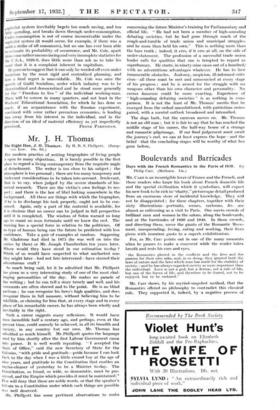Mr. J. H. Thomas
The Right Hon. J. H. Thomas. By H. R. S. Phillpott. (Samp- son Low. 10s. 6d. ) 10.7. modern practice of writing biographies of living people is open to many objections. It is barely possible in the first place to regard a living contemporary from the requisite angle of detachment. The writer is too close to his subject ; the atmosphere is too personal ; there are too many temporary and irrelevant considerations to be taken into account. Irrelevant, that is to say, when judged by the severe -standards of his- torical research. There are the victim's own feelings to res- pect ; and there is the law of libel lurking somewhere in the background. All these are things with which the biographer, if he is to discharge his task properly, ought not to be con- cerned. Again, only a part of the material is available, for it is obvious that no career can be judged in full perspective until it is completed. The wisdom of Solon warned us long ago to count no man fortunate until we knew the end. The warning has a special force in relation to the politician. Of no type of human being can the future be predicted with less confidence. Take a pair of examples at random. Supposing Mr. Gladstone had died in 1875 (he was well on into the sixties by then) or Mr. Joseph Chamberlain ten years later.
Where would they have stood in our estimation to-day ? Which of us would have suspected to what uncharted seas they might later—had not fate intervened—have steered their adventurous craft ? '
So much being said, let it be admitted that Mr. Phillpott has given us a very interesting study of one of the most chal- lenging personalities of the day. He makes no parade of fine writing ; but he can tell a story tersely and well, and his comments are often shrewd and to the point. He is no blind partisan ; he can recognize his hero's high qualities, and does recognize them in full measure, without believing him to be infallible, or claiming for him that, at every stage and in every phase of his remarkable career, he has always been wholly and inevitably in the right.
Such a career suggests many reflexions. It would have been incredible half a century ago, and perhaps, even at the present time, could scarcely be achieved, in all its breadth and variety, in any country but our own. Mr. Thomas has admitted as much himself. Mr. Phillpott quotes the language used by him shortly after the first Labour Government came into power. It is well worth repeating. " I accepted the Seals of Office," said the new Secretary of State for the Colonies, "with pride and gratitude—pride because I can look back to the day when I was a little errand boy at the age of nine years, and gratitude to the Constitution that enables an engine-cleaner of yesterday to be a Minister to-day. The Constitution, so broad, so wide, so democratic, must be pre- served, and the. Empire which provides it must be maintained." Pew will deny that these are noble words, or that the speaker's tribute to a Constitution under which such things are possible Was well deserved.
• Mr.,,Phillpott has some pertinent observations to make concerning the -future Minister's training for Parliamentary and official life. " He had not, been a member of high-sounding debating societies, but he had gone through much of the rough-and-tumble of trade union and municipal struggles, and he more than held his own." This is nothing more than the bare truth ; indeed, it errs, if it errs at all, on the side of under-statement. The profession of a successful trade union leader calls for qualities that one is tempted to regard as superhuman. He starts, in ninety-nine cases out of a hundred; with no adventitious advantages whatever. He has to face innumerable obstacles. Jealousy. suspicion, ill-informed criti- cism—all these must be met and surmounted at every stage of his progress ; and he is armed for the struggle with no weapons other than his own character and personality. No cursus honorung could be more exacting. Experience of high-sounding debating societies " is as nothing in com- parison. It is not the least of Mr. Thomas' merits that he emerged from the ordeal unembittered, with patriotism unim- paired, with a mental outlook broadened and intensified.
The dogs bark, but the caravan moves on. Mr. Thomas is not an old man ; but it is fair to say that he has reached the middle stage of his career, the half-way house of a strange and romantic pilgrimage. If our final judgement must await the journey's end, we can at least express the hope—and the belief—that the concluding stages will be worthy of what has gone before.






























 Previous page
Previous page